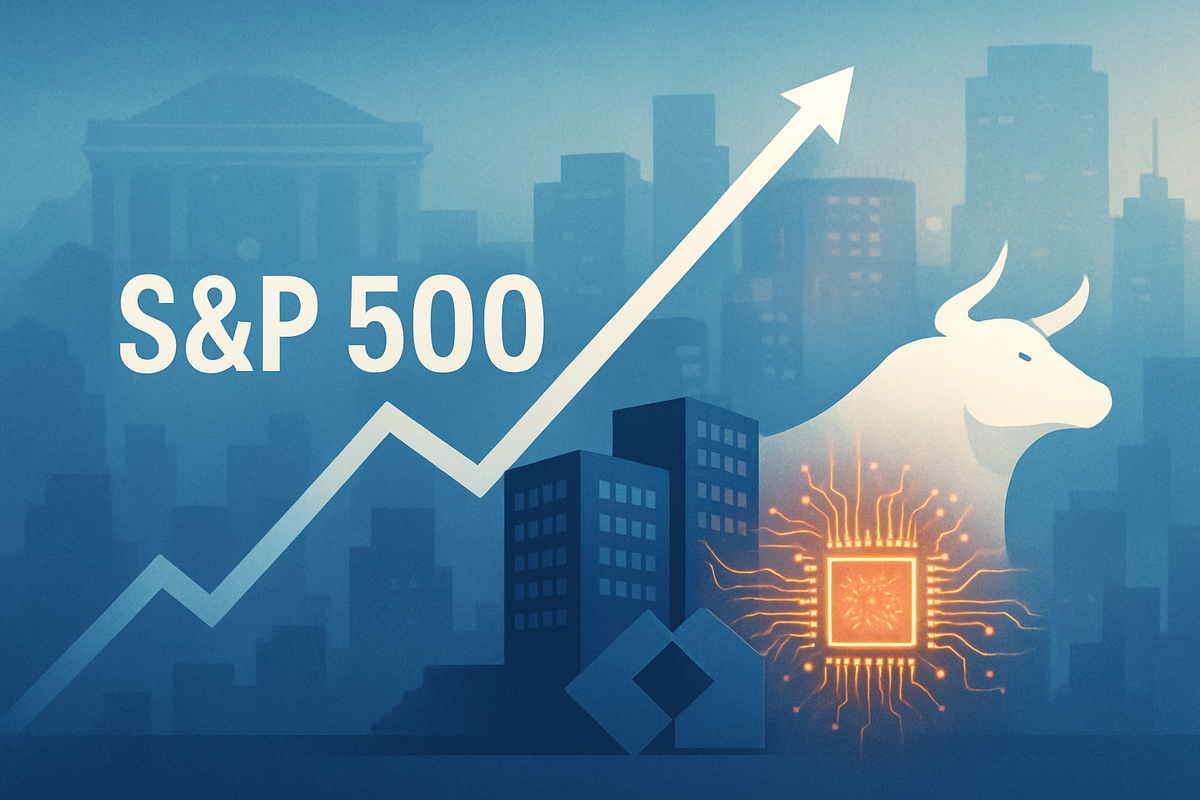
The U.S. financial landscape is currently a tapestry of contrasting narratives, yet the S&P 500 index has demonstrated remarkable resilience, climbing to new highs even as a government shutdown casts a shadow over Washington. This paradoxical market strength is being fueled by two significant corporate developments: a major acquisition in the banking sector and a game-changing partnership between chip giant Advanced Micro Devices (NASDAQ: AMD) and AI trailblazer OpenAI. These diverse factors are collectively shaping market sentiment, pushing investor optimism past political gridlock, and signaling robust underlying economic currents driven by technological innovation and strategic consolidation.
Investors are largely shrugging off the temporary economic uncertainties posed by the government shutdown, instead focusing on the long-term growth potential unlocked by these corporate maneuvers. The confluence of a substantial bank merger, promising increased efficiency and market reach, and a strategic alliance poised to accelerate the AI revolution, is creating a powerful upward momentum. This suggests a market prioritizing fundamental corporate growth and technological advancement over short-term political volatility, indicating a deep-seated confidence in the future trajectory of key economic sectors.
Banking Giants Consolidate, AI Titans Unite
The financial sector witnessed a seismic shift today with the announcement that Fifth Third Bancorp (NASDAQ: FITB) will acquire Comerica Incorporated (NYSE: CMA) in an all-stock transaction valued at approximately $10.9 billion. This landmark deal, set to create one of the nation's largest regional banks with combined assets nearing $288 billion, is a clear signal of accelerating consolidation within the U.S. banking industry. Comerica shareholders are slated to receive 1.8663 Fifth Third shares for each of their Comerica shares, representing a significant 20% premium. The merger is strategically designed to enhance scale, profitability, and geographic reach, particularly bolstering Fifth Third's presence in high-growth markets across the Southeast, Texas, Arizona, and California.
Simultaneously, the technology world is abuzz with the news of a multi-year, multi-generation strategic partnership between Advanced Micro Devices (NASDAQ: AMD) and OpenAI. This monumental collaboration will see OpenAI deploy up to 6 gigawatts of AMD Instinct GPUs to power its next-generation artificial intelligence infrastructure, with an initial 1 gigawatt deployment of AMD Instinct MI450 Series GPUs commencing in the latter half of 2026. The partnership extends beyond hardware supply, involving deep technical and software alignment, and even includes a warrant for OpenAI to acquire up to 160 million shares of AMD common stock. This alliance is poised to significantly diversify the AI chip supply chain and intensify competition in the high-performance computing market, challenging NVIDIA's (NASDAQ: NVDA) long-standing dominance.
Adding to this complex market environment, the U.S. government entered a shutdown on October 1, 2025, due to a failure to pass funding legislation. Despite the political impasse, the S&P 500 has not only held steady but has continued its ascent, closing at new record highs. This resilience aligns with historical precedents, where short-lived shutdowns have often had minimal long-term market impact. Investors appear to be prioritizing stronger corporate earnings, the anticipation of further Federal Reserve interest rate cuts (following a September 2025 cut), and the powerful momentum generated by AI innovation over the temporary disruption of government services. The delay in economic data releases due to the shutdown may even be contributing to a "no news is good news" sentiment, potentially nudging the Fed towards more accommodative monetary policy.
Who Stands to Gain, Who Faces Challenges?
The Fifth Third-Comerica deal positions both entities for significant shifts. Comerica Incorporated (NYSE: CMA) shareholders are immediate winners, benefiting from a substantial acquisition premium and a strong valuation for their holdings. For Fifth Third Bancorp (NASDAQ: FITB), the acquisition promises expanded market share, enhanced operational efficiencies, and a stronger foothold in lucrative growth regions, potentially leading to long-term revenue and earnings growth. However, integration challenges and initial dilution could present short-term headwinds. The broader banking sector will likely see increased pressure for consolidation, potentially impacting smaller regional banks that may find it harder to compete on scale and technological investment.
In the AI arena, Advanced Micro Devices (NASDAQ: AMD) is poised for massive gains. The partnership with OpenAI is expected to generate tens of billions of dollars in annual revenue, potentially exceeding $100 billion in new revenue over four years. This deal not only validates AMD's Instinct GPU roadmap but also significantly bolsters its market share and credibility in the high-growth AI accelerator market, directly challenging NVIDIA's (NASDAQ: NVDA) near-monopoly. OpenAI, for its part, secures a critical, diversified supply of high-performance computing power, essential for its ambitious AI development goals, reducing its reliance on a single vendor. Competitors like NVIDIA (NASDAQ: NVDA) and Intel (NASDAQ: INTC) will face intensified competition, pushing them to innovate faster and potentially adjust pricing strategies.
The government shutdown, while not impacting the S&P 500 broadly, could create winners and losers in specific niches. Companies with significant government contracts or those heavily reliant on federal permits and approvals might experience delays and financial strain. Conversely, businesses in sectors less dependent on government operations, particularly the technology sector and companies with robust international revenue streams, are largely insulated and continue to thrive. The market's focus on broader economic fundamentals and the expectation of a swift resolution suggest that the overall impact on most public companies will be transient.
Broader Implications and Market Trends
The Fifth Third-Comerica merger is indicative of a broader trend of consolidation sweeping through the U.S. regional banking sector. Driven by a quest for greater scale, the need to spread significant technology investments (including AI and digital banking) across a wider revenue base, and a potentially more favorable regulatory environment, banks are seeking to grow larger to compete with national giants. This trend is expected to continue, reshaping the financial services landscape and potentially leading to a more concentrated, yet perhaps more resilient, banking system. Regulatory bodies will be closely scrutinizing these deals for antitrust implications and systemic risk.
The AMD-OpenAI partnership is a watershed moment for the AI industry, signaling a critical step towards diversifying the AI chip supply chain. For years, NVIDIA (NASDAQ: NVDA) has been the undisputed leader, but this deal demonstrates a clear intent by major AI developers like OpenAI to foster a multi-vendor strategy. This will not only accelerate AI development by increasing the availability and diversity of high-performance hardware but also democratize access to advanced AI compute resources. The emphasis on open software ecosystems, such as AMD's ROCm platform, is crucial for fostering innovation and reducing vendor lock-in, paving the way for faster advancements across various AI applications.
The ongoing government shutdown, while a political spectacle, highlights the market's evolving relationship with political instability. Historical precedents show that the S&P 500 often weathers these storms, with investors looking past temporary disruptions to fundamental economic drivers. The Federal Reserve's anticipated rate cuts are playing a crucial role in mitigating negative sentiment, emphasizing the central bank's power to influence market direction even amidst political gridlock. This situation underscores the market's sophisticated ability to differentiate between transient political events and long-term economic trajectories, particularly when strong corporate earnings and technological innovation are at play.
What Comes Next: Navigating a Dynamic Landscape
In the short term, the market will closely watch the integration process of the Fifth Third-Comerica deal. Successful synergy realization and smooth operational transitions will be key to investor confidence. For AMD, the focus will be on the execution of its partnership with OpenAI, ensuring timely delivery of its Instinct GPUs and the continued development of its AI software ecosystem. Any hiccups could be met with investor scrutiny. The resolution of the government shutdown remains a pressing short-term concern, though the market's current resilience suggests it expects a relatively swift conclusion.
Longer term, the banking sector is likely to see further M&A activity, with a potential for larger, more complex deals. This could lead to a more consolidated industry, offering greater stability but also raising questions about competition and consumer choice. For the AI industry, the AMD-OpenAI partnership sets the stage for an intensified battle for AI chip dominance, driving rapid innovation and potentially lower costs for AI compute. We can expect a proliferation of AI-powered applications and services across all sectors, fundamentally reshaping industries and consumer experiences.
Potential strategic pivots will be necessary for competitors in both the banking and tech sectors. Smaller banks may need to consider strategic partnerships or niche specializations to survive. NVIDIA (NASDAQ: NVDA) and Intel (NASDAQ: INTC) will undoubtedly ramp up their own AI strategies and product roadmaps to counter AMD's ascendancy. Market opportunities will emerge in infrastructure development for AI, cybersecurity for an increasingly digital banking sector, and specialized services catering to the evolving needs of both industries. The primary challenge will be navigating the rapid pace of technological change and adapting to evolving regulatory environments.
Comprehensive Wrap-Up
The current market rally, despite the U.S. government shutdown, underscores a powerful narrative: the financial markets are increasingly driven by fundamental corporate strength and technological innovation. The landmark acquisition of Comerica (NYSE: CMA) by Fifth Third Bancorp (NASDAQ: FITB) signals a robust trend of consolidation in the banking sector, aiming for efficiency and expanded market reach. Concurrently, the strategic partnership between Advanced Micro Devices (NASDAQ: AMD) and OpenAI marks a pivotal moment in the AI industry, promising to diversify the AI chip supply chain and accelerate the pace of artificial intelligence development.
Moving forward, the market's trajectory will likely continue to be shaped by these powerful forces. Investors should keep a close eye on the integration success of the bank merger, the execution and expansion of the AMD-OpenAI partnership, and any further developments in the AI chip market. While the government shutdown remains a potential, albeit seemingly temporary, headwind, the overriding sentiment is one of optimism, propelled by the transformative potential of AI and the strategic evolution of key industries. The S&P 500's current performance suggests a market that is resilient, forward-looking, and fundamentally confident in the long-term growth prospects of a technologically advancing economy.
This content is intended for informational purposes only and is not financial advice





